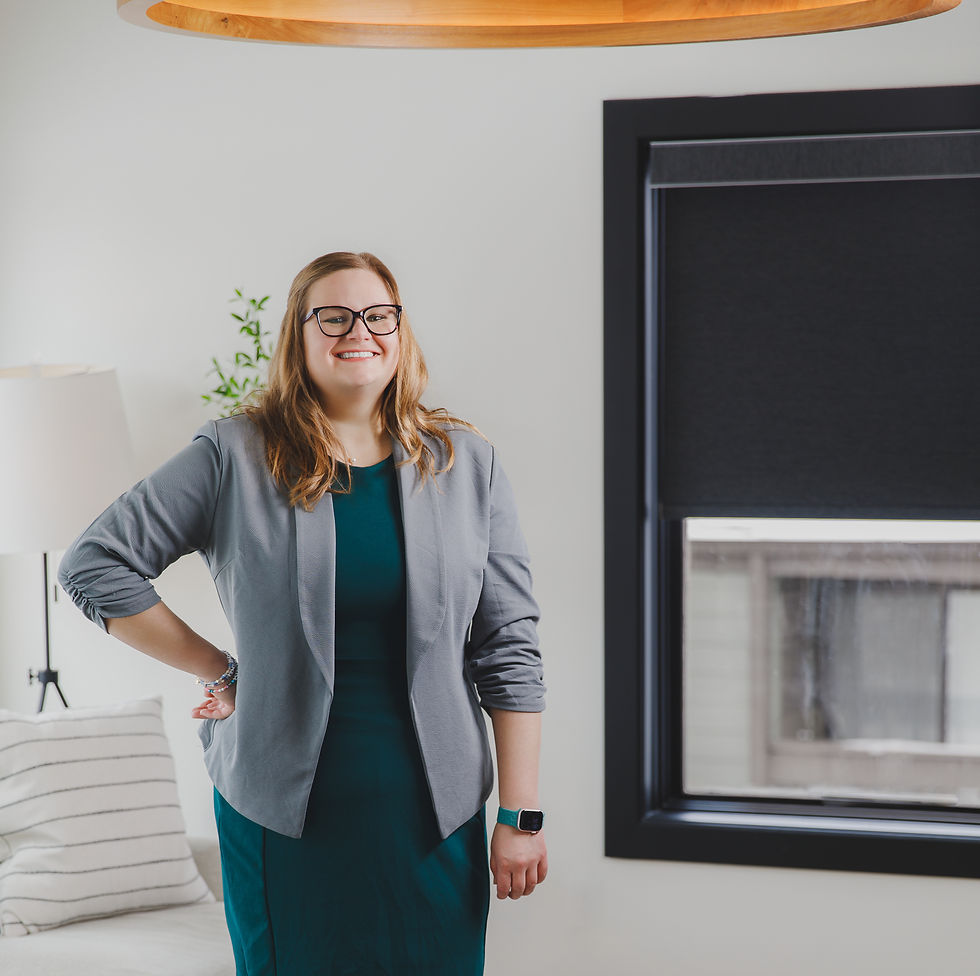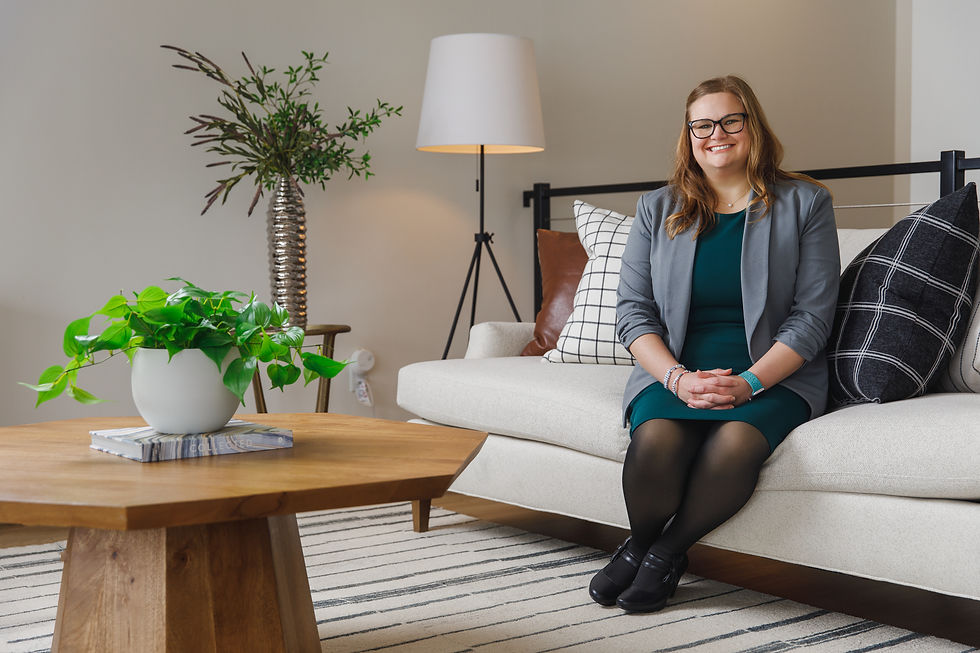Welcome Whitten: Meeting with the American Lung Association's New Executive Director
- Information VOICE_TRIBUNE
- Mar 1, 2025
- 6 min read
By Renae Ison • Photos By Matt Johnson

In a significant leadership transition, Whitten Montgomery has been appointed as the new Executive Director of the American Lung Association (ALA), a revered institution dedicated to improving lung health and preventing lung disease across the United States. With a history of impactful work with organizations like the American Heart Association, Montgomery has crafted a skillset in nonprofit management, advocacy, and public health. Montgomery brings with her a fresh perspective and dynamic energy to the role and is uniquely positioned to elevate the ALA’s initiatives at a critical time when lung health issues are at the forefront of public health concerns. We recently had the opportunity to speak with Whitten about her new role.
RI: Tell us a bit about your background.
WM: I was born and raised here in Louisville. I went to a small school in Gambier, Ohio, Kenyon College. The most unique thing about me is when I was nine years old, I started a local nonprofit here in Louisville. It does not exist anymore, but I started 501c3 called Kids Acting Against Cancer. We ran for over 20 years. Our mission was to change the lives of children touched by cancer through the arts. We provided drama therapy for kids touched by cancer. This gave kids the opportunity to walk in someone else’s shoes in a safe space while they were navigating their own or a family member’s diagnosis. When I was five, my mom was diagnosed with non-Hodgkin’s lymphoma. She is doing great now, but her perseverance and positivity are what inspired me to get involved with non-profit work.
RI: How has that helped you in your current role today?
WM: I often joke that I learned a lot of my nonprofit expertise through trial and error. Since I started nonprofit work at such a young age, I am not afraid to ask for anything. When I was a kid, I would go door to door and ask all businesses to support my work to help kids with cancer. So, I think it has made me a little bit fearless, and it has also made me scrappy. Starting an organization from scratch, I had to be adaptable and learn to act quickly. I think this gave me the ability to look at problems from a different mindset because I still have that childlike belief that we can fix anything, and this mindset helped me learn to communicate with all kinds of people. When I was a kid, I would talk to anybody with no fear because if they just said no, that was okay. We could just move on and talk about something else. I never wanted to force someone to do something they weren’t interested in. I was doing work that I believed in, and if others didn’t support it, I knew that I could find people who did. This has helped me as an adult as I develop my career in the nonprofit space. I never look at fundraising as a “sales” job, because I don’t think I am selling something. I believe that I am supporting a mission and creating a vision for a better tomorrow. My work is to find others who are passionate about the mission and combine resources to make change. After I stepped back from my day-to-day role with Kids Acting Against Cancer, I still managed the board. I started working at March of Dimes, where I managed the March for Babies campaign. This is when I first learned about the peer-to-peer fundraising world. My next role was with the American Heart Association, where I worked for over five years. I was their Senior Development Director, and over the years, I led the Heart Walk, Heart Ball, and Go Red for Women Luncheon. Managing large-scale fundraising events like these provided me with an excellent foundation to step into my role as the leader of the Kentucky market for the American Lung Association. It’s interesting, because when I was in college I studied Spanish, lived in Costa Rica, and even took the LSAT. After that, I went on to get my Master’s at UofL in College Student Personnel. I thought that I was going to do all these different things, but my heart just kept saying, “No, you’re called to service through non-profit work.” So, here I am, and I couldn’t be happier.

RI: Can you tell us about the current day-to-day, and what that role as an Executive Director looks like for you?
WM: Well, every day is different, which I love. Our mission is to save lives by improving lung health and preventing lung disease through research, education and advocacy. This is a big mission - so, I have to wear several different hats to support our work. In terms of research, much of this is managed by the national organization; however, we are lucky to have some of our research grants funded right here at the University of Louisville. I love to meet with our local grant recipients to learn about their work and share it with our local leadership and volunteers. In terms of education, I hope to make some large strides locally. During the pandemic, many of our statewide programs had to decrease, and I am working to launch the first Community Connections in the Midland States Region. These are educational events - catered to either medical professionals or the general public - that provide innovative panels or presentations around our strategic priorities. In terms of advocacy, we just hosted our annual Advocacy Day in Frankfort. We partnered with #ICanEndTheTrend and the American Heart Association to help bring awareness to our Representatives and Senators about the current lack of enforcement for the Tobacco 21 Law. We are hopeful that in this session, Senate Bill 100 will be passed, so that we can ensure children across Kentucky are protected. In order to support all of these efforts for our mission, I manage our Local Leadership Board and our Development Team. We host three large-scale fundraising events.
Our largest event is the Fight for Air Climb at Lynn Family Stadium - it’s a one-of-a-kind event where individuals climb the perimeter of the stadium! We also host the Derby Eve gala that we do at the Seelbach on Oaks night. We also are launching a new event in November called Breathe. It will be centered around Bourbon - and we loved the name because bourbon breathes just as our lungs breathe. I am hopeful that this event will attract individuals from different age groups, so that we can diversify our support base.
RI: Currently what challenges are you facing today with the American Lung Association?
WM: When I first started, I surveyed our Local Leadership Board to see what they thought our biggest challenges were. I completely agree with their assessment. We need improvement in local awareness and education. A lot of people do not know that we are here in Kentucky. People might know we are a national organization, but they do not know we are here making a difference with local programming specifically curated for the needs of Kentuckians. We are creating a strategic plan to revitalize our communications and marketing to ensure that the community learns about the work that we are doing and that we are present in cities beyond Louisville that need our support. Additionally, we are launching the Community Connections series to ensure that we are providing education statewide around lung health. Kentucky is constantly ranked as one of the worst states of lung health and air quality, and we need to ensure that we are providing resources, tools and education to all of our constituents. Our programs, knowledge and tools can save lives, but it’s our job to ensure that we are meeting people where they are. I love Kentucky, and I believe that we can do better to share our resources and support our citizens. So, I am working to provide that support. It will take time, but it is worth it.

RI: To anyone interested in, for example, doing advocacy work or donating to the American Lung Association, what would they be able to do to do that?
WM: They could join some of our events! The 2025 Louisville Fight for Air Climb is coming upon March 23 at Lynn Family Stadium. Learn more about it at climblouisville.org. Our Derby Eve Gala is an incredible event at the Seelbach - learn more at derbyevegala.org. For advocacy, anyone can join our action network! You can go to https://www.lung.org/ky and learn a whole lot about the diverse ways to get engaged with us.
Want to learn more about Whitten?
She and her friend Maggie Patten started a podcast called Unmute. Three years ago, Whitten faced the darkest chapter of her life, losing her home, safety, and sense of self. Filled with shame and fear for her personal safety, she never shared her story. Whitten is finally ready to unmute. Join Whitten Montgomery and Maggie Patten on “Unmute,” where they share Whitten’s story and her hard-earned wisdom about abuse, the legal system, and personal safety. Unmute aims to provide support and understanding, creating a vital resource for those who need it most. Tune in and discover the strength to reclaim your voice. Available on Apple Podcasts, Spotify and Buzzsprout.






I was diagnosed with Parkinson’s disease four years ago. For over two years, I relied on Levodopa and several other medications, but unfortunately, the symptoms kept getting worse. The tremors became more noticeable, and my balance and mobility started to decline quickly. Last year, out of desperation and hope, I decided to try herbal treatment program from NaturePath Herbal Clinic. Honestly, I was skeptical at first—but within a few months of starting the treatment, I began to notice real changes. My movements became smoother, I was steadier on my feet, and, incredibly, the tremors stopped completely. It’s been a life-changing experience. I feel more like myself again—better than I’ve felt in years. If you or a loved one is struggling…